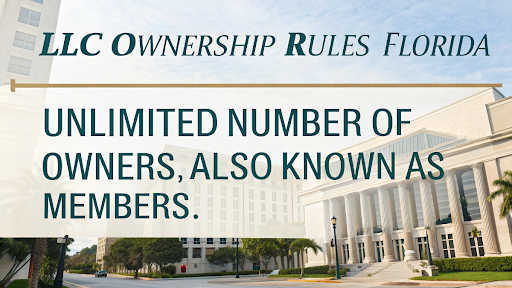Understanding LLC Ownership in Florida
When forming a Limited Liability Company in Florida, one of the most common questions new business owners ask is about ownership. Specifically, many people want to know how many owners an LLC can have in the state. The term “owner” in an LLC is referred to as a “member,” and Florida law is flexible when it comes to membership. Unlike corporations that often have strict structures with shareholders, directors, and officers, an LLC in Florida allows both individuals and entities to become members with relatively simple requirements.
The ownership of an LLC is outlined in the Articles of Organization and Operating Agreement, showing who the members are, their responsibilities, and profit shares. Florida allows unlimited members, so an LLC can be single-owned or have hundreds of members. A quick Sunbiz Florida search helps you check existing businesses and ensures your LLC’s structure is unique. This flexibility is why LLCs remain a top choice for entrepreneurs in the state.
Single Member LLCs in Florida
A single member LLC is an LLC owned by one person or one entity. In Florida, single member LLCs are very common because they provide entrepreneurs with liability protection while keeping operations simple. The single owner is responsible for decision-making, profit allocation, and compliance requirements. From a tax perspective, the IRS treats a single member LLC as a disregarded entity, meaning that income is reported directly on the owner’s personal tax return without the need for corporate filings.
The simplicity of a single member LLC makes it attractive for freelancers, consultants, small shop owners, and even larger businesses testing new markets. Florida law does not restrict single member LLCs in any way, and the owner still enjoys liability protection, ensuring that personal assets are kept separate from business debts. This structure is often recommended for individuals starting small and planning to expand in the future.
Multi Member LLCs in Florida
A multi member LLC in Florida is owned by two or more individuals or entities. This structure is particularly beneficial when a business is launched as a partnership or involves multiple investors. Each member contributes resources, whether financial, intellectual, or operational, and in return, they receive ownership percentages agreed upon in the Operating Agreement. Florida allows members to divide ownership equally or based on the level of contribution.
Having multiple members can strengthen an LLC by pooling skills, capital, and networks. However, it also introduces complexity. Decisions must often be made collectively, and disputes may arise if the Operating Agreement is not clearly defined. That is why legal advisors recommend drafting a detailed Operating Agreement that sets rules for profit sharing, voting rights, dispute resolution, and what happens if a member decides to leave the business.
Florida Law on Maximum Number of Members
Florida law does not impose a limit on the number of members that an LLC can have. This means that an LLC can operate with just one owner or expand to include dozens or even hundreds of members, depending on the business model. The flexibility to scale ownership makes LLCs attractive for both small businesses and large enterprises seeking to bring in multiple stakeholders.
This unlimited membership flexibility allows businesses in Florida to attract more investors while maintaining the benefits of an LLC structure. Unlike S Corporations, which cap the number of shareholders, an LLC does not face such restrictions. This makes the LLC structure versatile for companies with ambitions to grow and diversify ownership without being restricted by rigid ownership rules.
Role of the Operating Agreement in Defining Ownership
The Operating Agreement is the backbone of ownership management in an LLC. In Florida, while it is not mandatory to file the Operating Agreement with the state, it is highly recommended to draft one to avoid internal disputes. This agreement clearly defines each member’s role, the percentage of ownership, voting rights, responsibilities, and how profits and losses are allocated.
By customizing the Operating Agreement, members can ensure smooth operations even in complex ownership scenarios. It can also outline processes for admitting new members or removing existing ones. Without such an agreement, Florida law provides default rules, which may not align with the business’s specific needs. Thus, having a well-drafted Operating Agreement is essential in managing ownership structure efficiently.
Ownership by Individuals and Entities in Florida LLCs
In Florida, both individuals and entities such as corporations, other LLCs, or even foreign companies can own an LLC. This flexibility allows entrepreneurs to structure ownership in ways that optimize taxes, liability, and operational efficiency. For example, a real estate investor may set up multiple LLCs owned by a parent LLC to separate liabilities across different properties.

This broad ownership allowance makes Florida LLCs ideal for various industries, from startups and family businesses to investment firms. Allowing both local and foreign entities to become members of an LLC adds to Florida’s appeal as a business-friendly state. Entrepreneurs often use this flexibility to expand their ownership base without restrictions that are common in other business structures.
Tax Implications of Single and Multi Member LLCs
Ownership directly affects how an LLC is taxed in Florida. Single member LLCs are taxed as disregarded entities, meaning that all income flows to the individual owner’s tax return. Multi member LLCs, on the other hand, are taxed as partnerships by default, with profits and losses passed through to each member based on ownership percentages. This avoids double taxation, which is a common drawback of corporations.
Florida also allows LLCs to elect corporate taxation if members prefer. In this case, the LLC can be taxed as an S Corporation or C Corporation, depending on the election made with the IRS. The choice of taxation often depends on the number of owners, their personal tax situations, and the overall business strategy. Having multiple ownership options makes LLCs in Florida more adaptable to different financial and operational goals.
Benefits of Flexible Ownership Structures
The ability to have one or many owners provides businesses in Florida with strategic advantages. Entrepreneurs can start small as a single member LLC and later expand by adding new members, investors, or partners. This gradual scalability supports long-term business growth without forcing a change in entity type.
Furthermore, the flexible ownership rules allow families, groups of friends, and professional teams to co-own a business easily. By clearly defining ownership terms in the Operating Agreement, Florida LLCs can accommodate diverse ownership goals while still maintaining liability protection and tax efficiency. This makes the LLC one of the most versatile business structures available in the state.
Comparing LLC Ownership Rules with Other States
Florida’s flexible ownership structure is consistent with many other states but stands out due to its business-friendly environment. Some states have restrictions on ownership by foreign entities or impose limitations on how members can be added or removed. Florida, however, keeps the process simple and open, making it easier for businesses to operate without unnecessary bureaucracy.

Another distinction is that Florida does not require detailed annual disclosures about ownership changes, unlike some states with stricter compliance rules. This makes Florida LLCs easier to maintain and more appealing to both domestic and international investors. The straightforward ownership policies strengthen Florida’s reputation as a favorable state for entrepreneurs.
Common Ownership Mistakes to Avoid in Florida LLCs
One of the most common mistakes made by LLC owners is failing to draft an Operating Agreement. Without this legal document, disputes between members can escalate and threaten the stability of the business. Another mistake is not properly recording ownership percentages, which can cause conflicts when dividing profits or selling membership interests.
Additionally, some LLCs neglect to update their internal documents when adding or removing members. This oversight can create legal complications, especially if disputes arise in the future. To avoid these pitfalls, business owners in Florida should work with legal professionals when structuring ownership, documenting changes, and ensuring compliance with state laws.
Conclusion
The question of how many owners an LLC can have in Florida highlights one of the most appealing aspects of the business structure. Florida does not restrict the number of owners, allowing for single member LLCs as well as multi member arrangements with no maximum cap. This flexibility supports entrepreneurs, investors, and corporations looking to collaborate and grow their ventures within the state.
By clearly defining ownership through an Operating Agreement and understanding tax implications, business owners can make the most of this structure. Whether starting alone or with a large group of partners, Florida’s LLC laws provide the adaptability and protection needed to operate successfully. For anyone considering forming an LLC, understanding the ownership rules is a vital step toward building a strong and compliant business.



